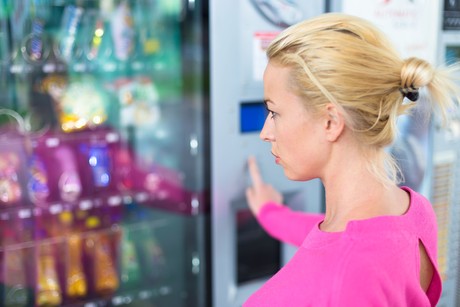No more sugary drinks at ACU campuses

Students presented with a choice between sugary drinks or water will often choose the unhealthier option, but Australian Catholic University (ACU) is removing this temptation by getting rid of all sugary drinks in its vending machines.
After analysis found sugary drinks made up around 55% of all beverages available in its vending machines, ACU got vending contractor Qualityvend to remove drinks with added sugar across all vending machines at its eight campuses. This would limit the amount of sugar its 32,000 students consumed as a result of soft drinks, flavoured waters, fruit drinks, cordials, iced teas, energy drinks and sports drinks.
While ACU is the first Australian university to take action, it hopes other universities, schools and workplaces will follow suit.
“We wanted to change the perception of what products are automatically expected to be sold in vending machines. ACU regularly reviews not just the goods and services we provide, but also the providers and supply chains we use. This is part of the university’s commitment to a sustainable and healthy environment in which to study and work,” said Professor Anne Cummins, Deputy Vice-Chancellor (Students Learning and Teaching) at ACU.
This follows the latest guidelines from the Department of Health in New South Wales which state that 75% of products stocked in vending machines must be healthier ‘everyday’ items, and only 25% can be unhealthy or ‘occasional’ products, such as some fruit juices and flavoured milks.
Robbie Allison of Qualityvend said: “Students, and the public in general, want healthier options. This is what has driven us to ensure that our vending machines meet these changing expectations. We don’t want to add to the obesity crisis in Australia, we would like to be part of the solution, machine by machine.”
The main concerns associated with soft drinks are their impact on health. One can of regular soft drink a day could lead to a 6.75 kg weight gain in one year, and an increased risk of type 2 diabetes. Considering 60% of Australians are overweight or obese, Dr Jason Wu of The George Institute for Global Health highlighted the need to take immediate action.
“We know when people are presented with healthier choices they choose them. When drinks such as these were removed from sale in universities overseas, people didn’t complain or demand their reinstatement. They simply swapped for a drink not loaded with sugar,” Wu said. “Sugary drinks are an important part of the picture when it comes to a healthy diet, but we would also like to see universities, public places and schools ensure that all of their food and drinks offerings meet healthy food guidelines.”
AFGC reviews progress on food and grocery manufacturing targets
In its latest food and grocery manufacturing sector report, AFGC reflects on the...
$15m AI space project to help boost Australian agriculture
The Australasian Space Innovation Institute is developing an AI-enabled geospatial national...
Barry Callebaut opens chocolate innovation centre in Singapore
The Callebaut Global Innovation Center is helping to advance the future of chocolate and cocoa...











